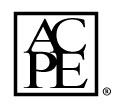| REQUEST PARKING » | MAP & DIRECTIONS » |
|
|
ARB 337
|
ARB 406
|
ARB 469
|
|
SESSION 1
12:15 pm – 1:00 pm
|
Elizabeth Sundberg, Pharm.D.
Non-insulin Therapies in Type 1 Diabetes Mellitus |
Katie Riggs, Pharm.D.
Managing of Acute Pain in Patients with Opioid Use Disorder |
Kalee Huddleston. Pharm.D.
Sodium Glucose Transporter-2 (SGLT2) Inhibitors in Heart Failure |
|
1:00 pm – 1:05 pm
|
Break for Transition between Speakers
|
||
|
SESSION 2
1:05 pm – 1:50 pm
|
Sarah Singer, Pharm.D.
Anticoagulation Needs in COVID-19 |
Nicole Nehring, Pharm.D.
The Controversy of Beta-Blockers in COPD: Do They Help or Harm? |
Bailey Archer, Pharm.D.
Safety of Concomitant Use of Linezolid with Serotonergic and Adrenergic Agents |
Registration is free, but is required in advance. Due to limited space, only those participants who register before 5:00 PM on Friday, November 27, 2020 will be able to request parking access on campus.
PARKING: To request parking, please first register for your desired sessions. Then, complete the parking questionnaire using the link above, or complete your parking request by clicking here>>>. If you do not request parking on our campus, or if you do not submit your request by the deadline, you will be re-directed upon arrival.
ATTENDANCE: All live participants will be required to sign in on the paper sheets, located within each room. Paper sign-in sheets will be reconciled against completed evaluations. Attendance for the virtual sessions will be captured once a participant joins the session and will be reconciled with completed evaluations. Any sessions that you did not attend will be removed from your account within two weeks following the seminars.
CPE CREDIT: Immediately following the presentation, registered participants will receive an email with a link to the evaluation. Within one week after attending the session, participants must complete this online evaluation. The CPE Administrator will submit each participant’s NABP number and date of birth combination to CPE Monitor for continuing education credit, no later than two weeks after the live presentation. Only ONE session may be claimed for each time block. If multiple concurrent sessions are claimed, or if a session is claimed that is not reflected on the paper sign or the attendance roster within Microsoft Teams Meeting, the offending participant forfeits CE credit.
SPECIAL ACCOMMODATIONS
Attendees of all abilities are welcome to participate. If you require reasonable accommodations, please notify Nicole Fields via email at Nicole.Fields@uhsp.edu in advance so that she may secure resources as soon as possible. Every effort will be made to make accommodations where necessary.
Date: Dec 2, 2020 12:00 PM - 02:00 PM
Fee
CE Hours
Activity Type
- Knowledge
Objectives
- Identify the limitations of current therapies available to patients with type 1 diabetes mellitus (T1DM)
- List the alternative agents currently approved for use in T1DM worldwide.
- Given a patient case, select an appropriate non-insulin adjunctive agent for the treatment of T1DM.
Speaker(s)/Author(s)
|
Elizabeth Sundberg, Pharm.D. |
Activity Number
0033-0000-20-082-L01-PCE Hours
Location
Speaker(s)/Author(s)
|
Katie Riggs, Pharm.D. |
Activity Number
0033-0000-20-083-L01-PCE Hours
Location
Objectives
- State current guideline recommendations for preferred treatment in patients with type 2 diabetes and established heart failure.
- Describe the results of recent trials looking at treatment with SGLT2 inhibitors in heart failure patients without diabetes.
- Identify an appropriate treatment strategy for a patient without diabetes who has heart failure
Speaker(s)/Author(s)
|
Kalee Huddleston. Pharm.D. |
Activity Number
0033-0000-20-080-L01-PCE Hours
Location
Objectives
- Describe the pathophysiology leading to increased incidence of venous thromboembolism (VTE) in COVID-19.
- Identify risk factors for VTE in a patient with COVID-19.
Speaker(s)/Author(s)
|
Sarah Singer, Pharm.D. |
Activity Number
0033-0000-20-084-L01-PCE Hours
Location
Objectives
- Identify limitations to the randomized controlled trial on the use of beta-blocker therapy in patients with COPD.
- Summarize the results of the observational trials and randomized controlled trial on the use of beta-blockers in COPD regarding overall harm versus benefit.
Speaker(s)/Author(s)
|
Nicole Nehring, Pharm.D. |
Activity Number
0033-0000-20-081-L01-PCE Hours
Location
Objectives
- Identify and describe serotonin syndrome.
- Summarize what the literature recommends when initiating linezolid concomitantly with serotonergic and/or adrenergic agents.
Speaker(s)/Author(s)
|
Bailey Archer, Pharm.D. |
